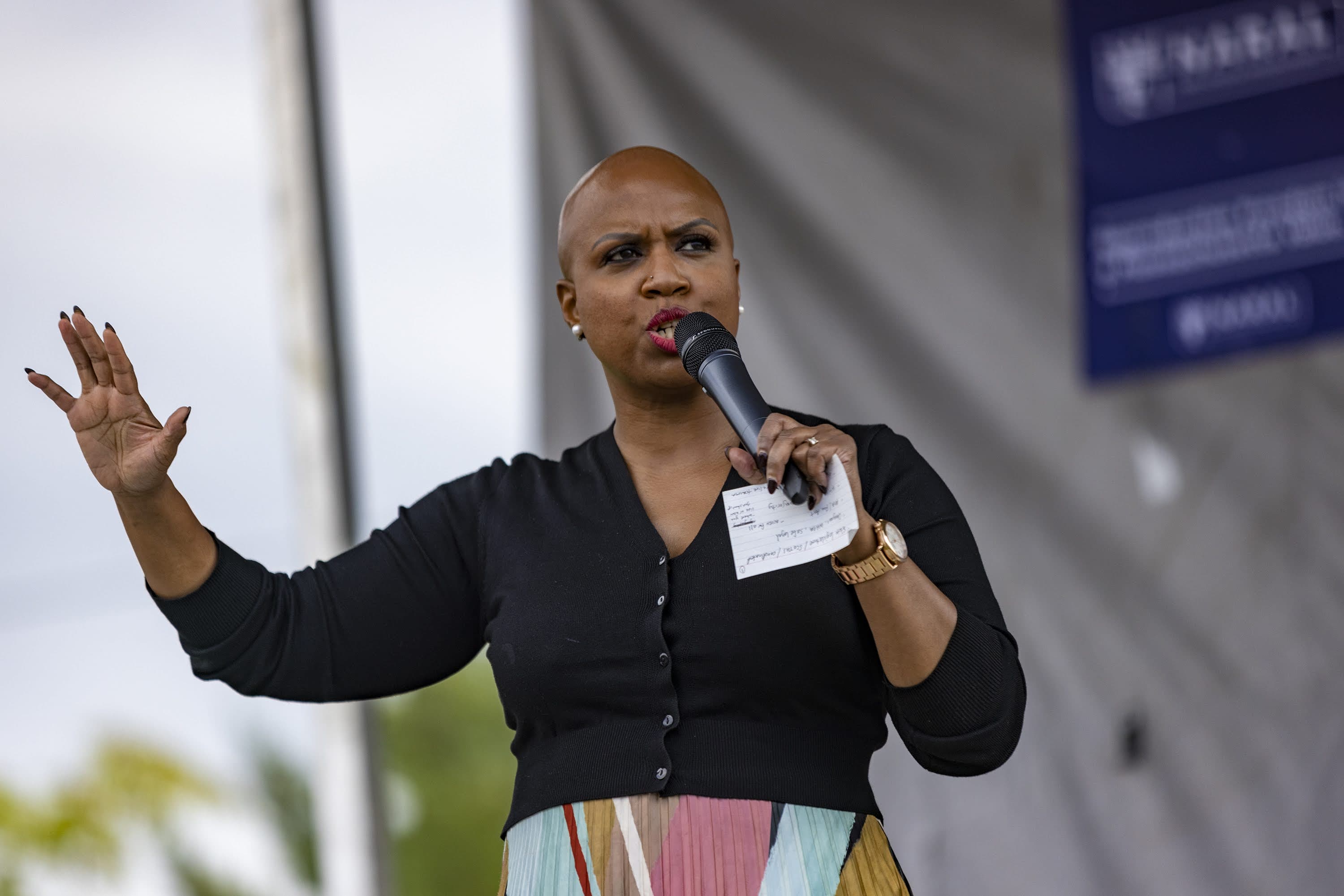Advertisement
WBUR Airwaves | Journalism that builds community

When Rep. Ayanna Pressley came to WBUR studios earlier this year, Tiziana Dearing knew exactly how to break the ice. For the last four years, the congresswoman has been an outspoken advocate for her community as well as a lover of fashion — including leather in colder weather.
"I wore my brown leather jacket and brown leather boots, which she got a kick out of," says Dearing, understanding the power clothing choices can have. "After that, we sat down and we really talked."
Pressley and Dearing have spoken many times over the last four years about specific policy issues or what's unfolding on Capitol Hill. But on this day, they were going to talk about life, identity, loss and joy.
"When you talk about policy, that's what you're doing," says Dearing. "When you talk with (congresspeople) one on one — let's say behind the scenes of an event or a sideline of a parade — you get a sense of who they are... and what really makes them tick."
That duality — examining news and public policy as well as having deeper conversations with people about what matters most to them — is a signature of Radio Boston. The team researches deeply and then focuses on a core idea or question.
What we care about is what listeners care about: about the neighbors who are in our day-to-day lives.
The conversation with Pressley was the first in a series of kitchen-table-style conversations with the Massachusetts Congressional delegation. The exchanges are intimate, wide-ranging and revelatory. The focus is on the individual and the experiences which inspire and drive them.
"People can understand better why our members are serving and what they believe in and where it comes from," says Dearing, adding that she has learned something new and personal in each of the discussions.
Conversations with Rep. Katherine Clarke and Sen. Elizabeth Warren aired in early September, joining Sen. Ed Markey along with Reps. Pressley, Lori Trahan, Jake Auchincloss, Seth Moulton and Jim McGovern. Scheduling is underway for discussions with the remaining three — Reps. Richard Neal, Stephen Lynch and William Keating.

On the local politics front, Boston Mayor Michelle Wu joins Dearing monthly to discuss the newest in the city. Massachusetts Governor Maura Healy does the same to review developments on the state level.
For every guest — a seasoned politician, a teacher, a father, a young activist — Dearing always takes time to connect with the person first. Whether it is a nod to a guest's fashion or pausing to ask Boston's mayor if she caught her breath between press conferences, Dearing builds trust and asks the core questions.
"What we care about is what listeners care about: about the neighbors who are in our day-to-day lives," says Dearing. "As we head into a new primary season, a new campaign season, greater environmental distress, greater financial distress — you'll be able to count on us to do both. We'll discuss what those issues are, but also how your neighbors are dealing with those issues."
Dearing asks about what motivates people and what they most desire. Those conversations are an essential part of community journalism: forging connections so that we can understand the issues as well as one another.
"At the heart of this is human connection," says Dearing. "We want to be where you are. We want to meet you."
Our listeners are the ones who know what the stories are. They’re the ones who know who their neighbors are.
It's one of the many reasons you'll see Radio Boston out of the studio and in your community more often. Broadcasting on location and speaking to community members — as they did from Somerville after the opening of the Green Line extension — is vital.
"Our listeners are the ones who know what the stories are. They're the ones who know who their neighbors are," says Dearing. "If we don't go where our listeners are, how will we find where the stories are?"
Those encounters — whether for hard-driving policy discussions or illuminating personal conversations — are what Dearing believes will transform and strengthen our society.
"Local is the solution to polarization. Reminding ourselves of our interdependence is the solution to polarization, and that means understanding our neighborhoods and neighbors," says Dearing. "It's hard to be polarized when you walk dogs together. It's hard to be polarized when you're rebuilding a neighbor's house because of flooding. Flooding doesn't care whether you're Republican or Democrat."
Radio Boston broadcasts live at 11 a.m. and again 3 p.m. ET.